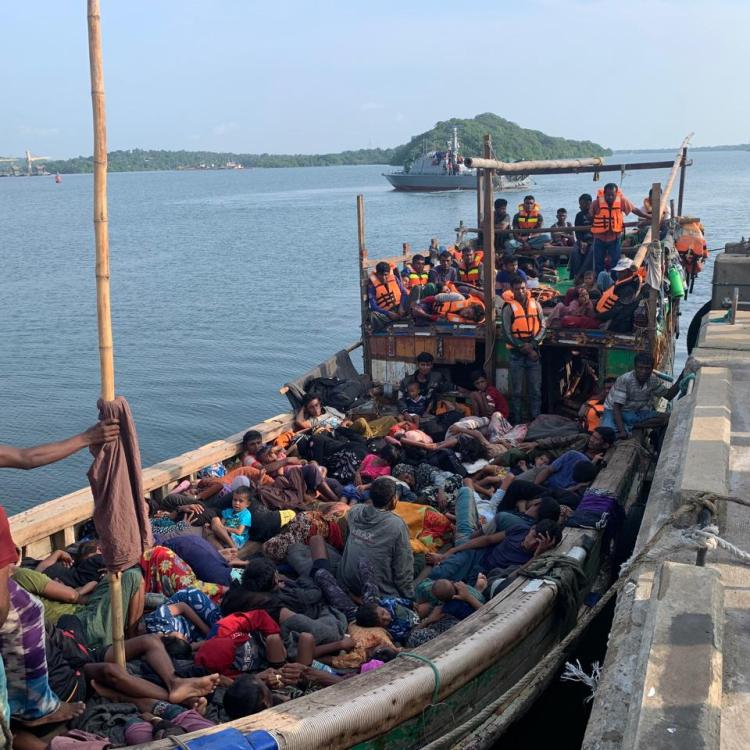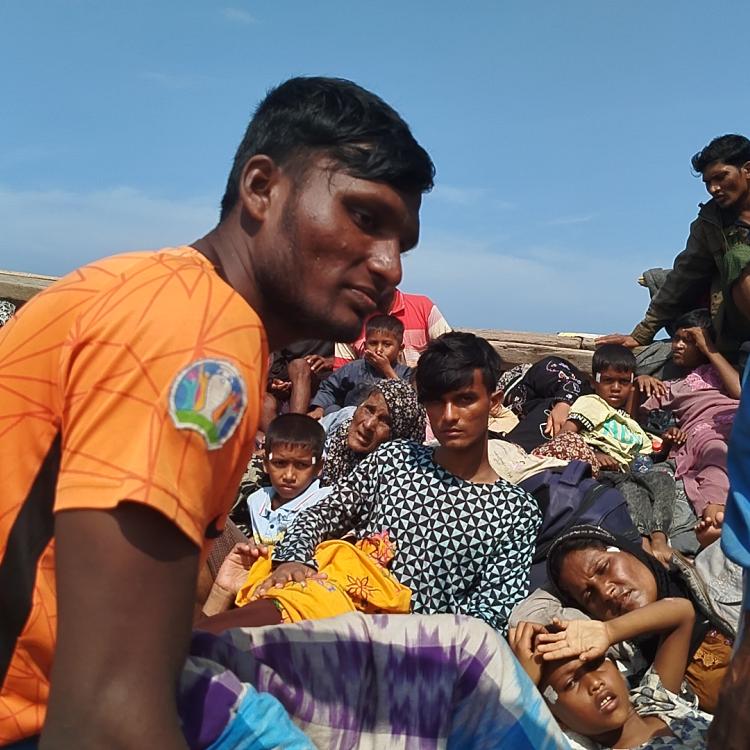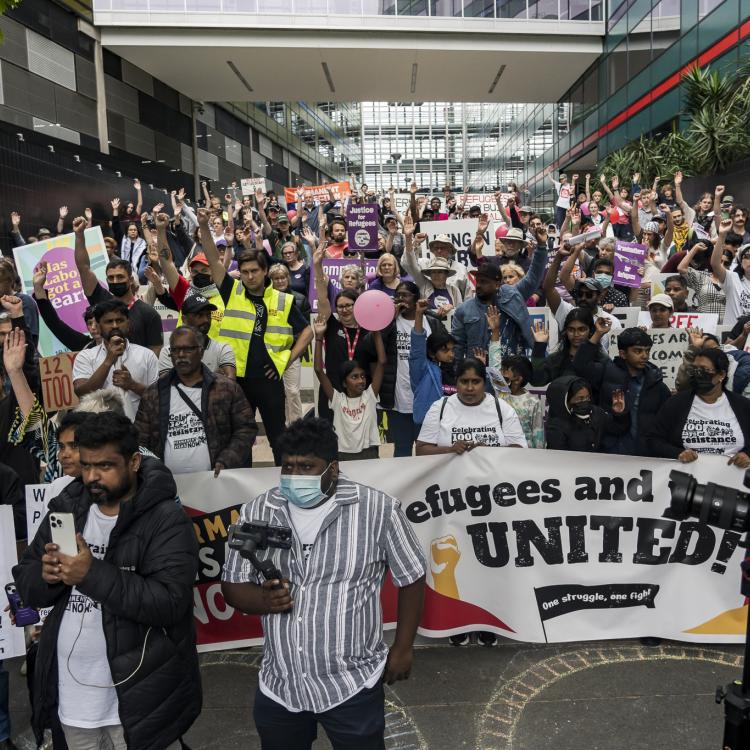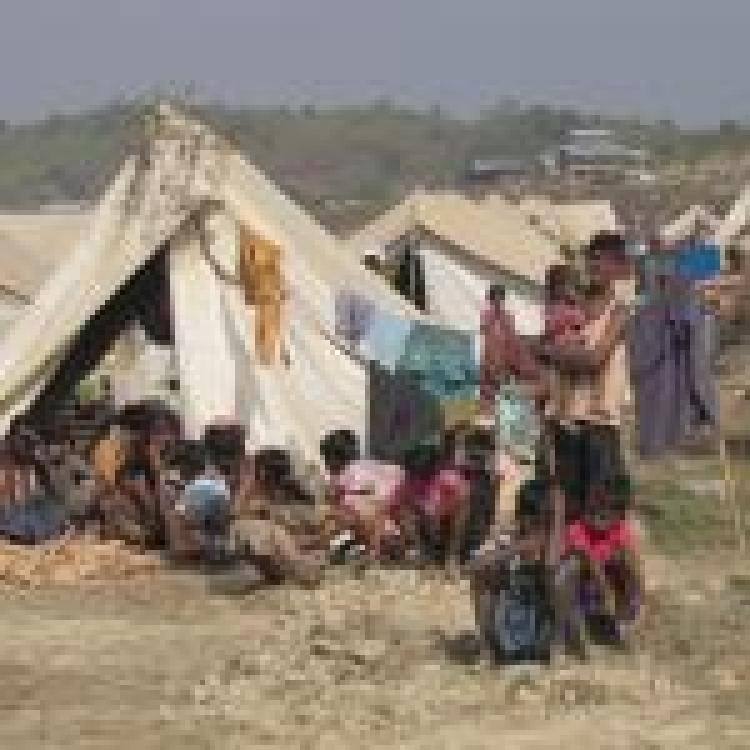The Human Rights Commission of Sri Lanka (HRCSL) has issued an urgent appeal to the Sri Lankan President for immediate access to assess the welfare and detention conditions of 115 Myanmar asylum seekers held in a Sri Lankan military camp since last week after drifting near the coast of Mullaitivu.
A multi-day trawler carrying over 100 Rohingya asylum seekers drifted towards the coast near Mullivaikkal in Mullaitivu on 19 December. The vessel was escorted by the Sri Lankan Navy to Ashroff Jetty in Trincomalee Harbour, arriving on 20 December. The asylum seekers were initially assisted by public officials and non-governmental organizations (NGOs), and were temporarily accommodated at a local school in Trincomalee. They were later presented before the Trincomalee Magistrate.
The migrants claimed in court that they had travelled to Sri Lanka to seek asylum. They had set out in three boats, but only one made it to the island. Those on board included 12 men who had helped them get there and 103 asylum seekers. While the 103 asylum seekers were to be transferred to the Mirihana Detention Centre, the judge ordered the 12 men to be placed on remand. Unprepared immigration officials weren't at first able to transfer the Rohingya to Mirihana. They were instead moved to a Sri Lanka Air Force camp near Mullaitivu.
In a letter to the Sri Lankan President, the HRCSL emphasized that among the asylum seekers are over 40 children, many of them infants. On Boxing Day a team of officials from the HRCSL, including the Director of Research and Monitoring, attempted to monitor the detention conditions at the Air Force Camp. They were refused access, however, by the air force personnel citing instructions from the Controller General of Immigration and Emigration.
The HRCSL then wrote to the Sri Lankan President the next day about their inability to gain access. The letter states that according to section 11(d) of the HRCSL Act, No. 21 of 1996, the powers and functions of the Commission extend not only to Sri Lankan citizens but to “any person” detained within Sri Lanka. Therefore, the Commission has the statutory authority to access the said Air Force Camp and monitor the detention conditions of all asylum seekers, including the children.
The HRCSL requested the Sri Lankan President to issue appropriate directives to relevant institutions to facilitate access to the asylum seekers. Additionally, it reaffirmed its statutory obligations to examine the conditions under which these asylum seekers are being held.
The refugees related heart breaking stories to local residents they met on the beach. Only one of the three boats they sailed out of Myanmar in reached the coast of Sri Lanka. Unfortunately, six people - four of them children -starved to death during the voyage. Their corpses had to be thrown overboard. They further disclosed that after being returned to Rakhine State in Myanmar, they were compelled to leave once more because of the brutality and deliberate extermination of their community by Myanmar state forces.
Human rights activists and legal experts along with 47 civil society organisations have voiced concerns over the denial of legal protections to the Rohingya asylum seekers, especially the children. International human rights obligations were being violated by Sri Lanka’s actions, including the United Nations Convention on the Rights of the Child, which ensures the protection and welfare of all children, regardless of their immigration status.
Human Rights Activist Shreen Abdul Saroor said that “this group consists primarily of children and women, while our forces are predominantly men. This is problematic because atrocities were committed against women and children during Sri Lanka’s armed conflict against Tamils, with no accountability. To have these same forces overseeing vulnerable groups like women and children is a concern because they are not trained for this role. There is a pregnant woman, a newborn baby, elderly persons, and two physically challenged individuals among the refugees. How equipped is our military system to care for them? What do they know about disability, malnutrition, or childcare? These are critical issues. When refugee situations are militarized without a neutral third party with expertise in refugee rights, their well-being is jeopardized. The presence of the UNHCR in Sri Lanka is crucial.”
When contacted by a media on December 29th for an update, the Minister of Public Security and Parliamentary Affairs, Ananda Wijepala, stated that “there is still no basis to consider them as refugees yet. For now, this is regarded as a case of human trafficking. The Ministry of Foreign Affairs has been in contact with the Myanmar government, and the list of names has already been shared with them. We will follow the legal process, engage in discussions with the Myanmar government, and, at this point, are considering deporting them. Until then, they will be held in Mullaitivu and provided with all necessary facilities. We will take action abiding by international law.”
A local lawyer with nearly 20 years of experience in refugee cases said that governments cannot deport individuals arbitrarily, as seen in Australia’s treatment of Sri Lankans arriving by boat. He said that once a boat reaches a border seeking asylum it cannot simply be sent back, as Sri Lanka claims it will. Even countries with harsh policies designed to deter boat arrivals, such as Australia, do not simply send arrivals back where they come from, instead resorting to holding them in remote islands or third party territories. The lawyer, named only as Dias, also highlighted Sri Lanka’s own history with refugees, saying that over a million have been made refugees during conflict on the island. Sri Lanka benefits greatly from remittances sent back by these refugees who remain abroad because other countries had accepted them as such, in line with international laws. "We, therefore, have a moral obligation to assist these individuals. We are only talking about around 100 people here,” he said.
Furthermore, the Controller General of Immigration and Emigration and other responsible officials who obstructed the HRCSL’s attempts to monitor the detention conditions of the said asylum seekers have been summoned to appear before the Commission on New Year's Eve, to provide an explanation regarding their actions.
Responding to the summons, the Immigration chief, along with Air Force officials and representatives from the Ministry of Public Security, presented themselves before the HRCSL and made their submissions.
"On 31st December, the Controller General expressed regret about it to us. She said there is a possibility that infection may spread through those who have come here seeking protection was the reason for not allowing anyone to meet them and nothing else," L.T.B. Dehideniya, the Chairman of the HRCSL told the media after their meeting.
However, Nihal Chandrasiri, Acting Director (Research & Monitoring) of the HRCSL, told the media no such reason was given to them when they went there to monitor the situation. The HRCSL president later said the Sri Lankan emigration and immigration officials now appear to have relented and assessment of the refugees could be about to go ahead.





